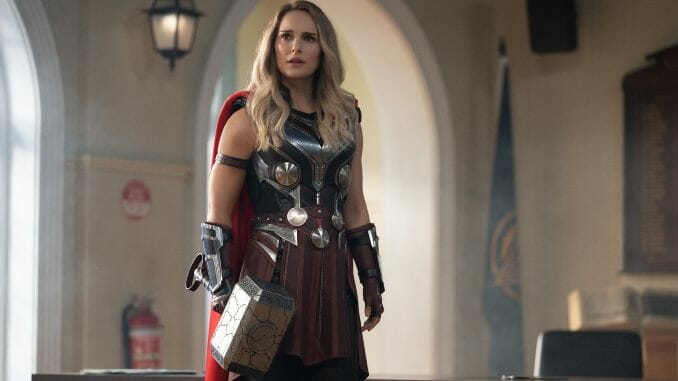Thor: Love and Thunder Fails Jane Foster and The Mighty Thor

Based on the marketing for Taika Waititi’s latest Marvel venture, Thor: Love and Thunder, you would think this was Jane Foster’s movie, right? Or, at the very least, partially her movie? In fairness, it almost is, but the film’s refusal to commit to a shared story between Thor Odinson and the Mighty Thor leaves what could have been a truly beautiful and empowering story of love and loss feeling hollow. So hollow, in fact, that even Natalie Portman’s insane gains can’t make up for the spectacular way in which Thor 4 failed Jane Foster.
![]()
In the post-post-credit scene of Thor: Love and Thunder, Jane is welcomed with open arms into Valhalla, greeted at the pearly gates by Heimdall. He invites her in, and she smiles before the screen cuts to black. In the tragic aftermath of yet another just-okay MCU movie, my first thought when reflecting on Jane’s epic return and subsequent death left me with one question: Why bring her back at all?
It certainly wasn’t to allow her character any type of grand personal growth. Throughout the film, Jane doesn’t change as a person (apart from physically), and even if she did, it would have happened off-screen. From start to finish, Jane is a hero through-and-through, always putting the safety of others first—which, in fairness, is a stark change from her one-dimensional portrayal from previous Thor films—but her development ends there.
Bafflingly, Waititi skirts over a mind-boggling amount of character moments for Jane, including the scene in which she becomes Mighty Thor in the first place. Rather than show the audience her transformation into Thor, we are instead relayed that information by Valkyrie, who apparently became Jane’s bestie off-screen as well. The relationship between Valkyrie and Jane, or lack thereof, makes these characters feel like afterthoughts, and does nothing to showcase any kind of meaningful connection between the two. Based on Waititi’s track record from Thor: Ragnarok—which gave Valkyrie (its only female hero) an insane amount of trauma but no space to actually deal with her emotions or alcoholism in a meaningful way beyond as a punchline—this didn’t come as a huge surprise. Even the scenes where Jane grapples with her cancer as she transforms back into herself (much sicker than she was before) fall victim to the film’s inconsistent pacing and tone, these moments undercut by jokes shortly after they occur.
In fact, Thor is the one who benefits most from Jane’s stagnant inclusion in the film, and, in particular, from her death. Early on, Chris Pratt’s Star-Lord tells Thor that he seems aimless, like he doesn’t have a purpose. He tells Thor that he needs something to make him “feel shitty” in order to regain a sense of purpose, attributing his own motivation to the pain he felt after he loved and lost Gamora. About halfway through the film, Thor tells Jane that he will love her in spite of her cancer, for all the time she has left (and that he’ll “feel shitty” about her when she’s gone, which is evidently his end goal). As Jane’s time runs out, it becomes clear that the true cancer responsible for her death is not her illness at all, but Thor’s character development.
-

-

-

-

-

-

-

-

-

-

-

-

-

-

-

-

-

-

-

-

-

-

-

-

-

-

-

-

-

-

-

-

-

-

-

-

-

-

-

-








































